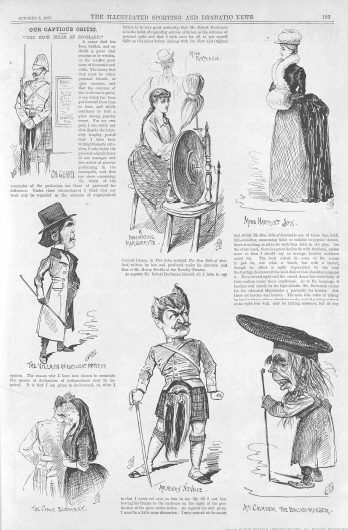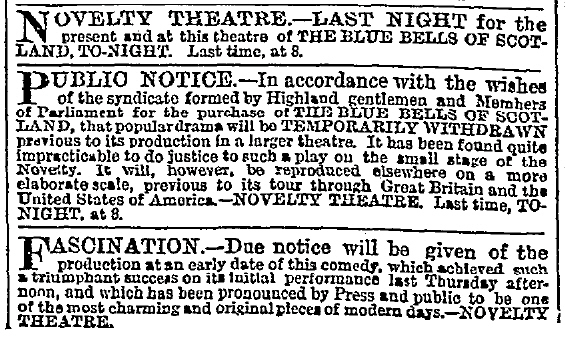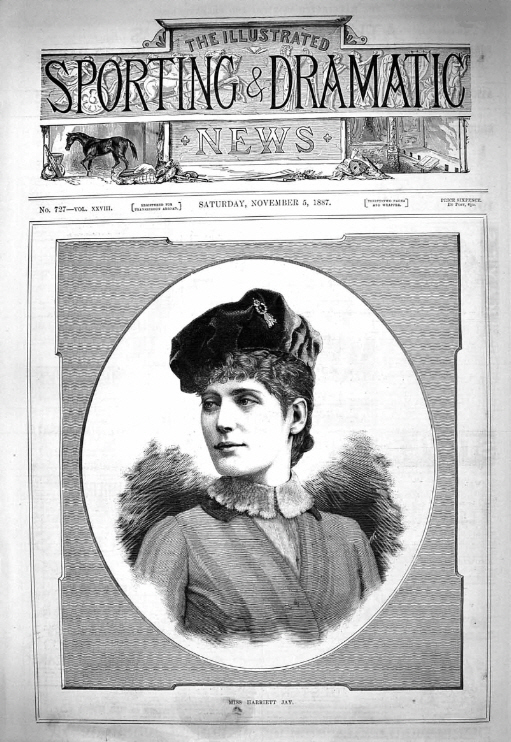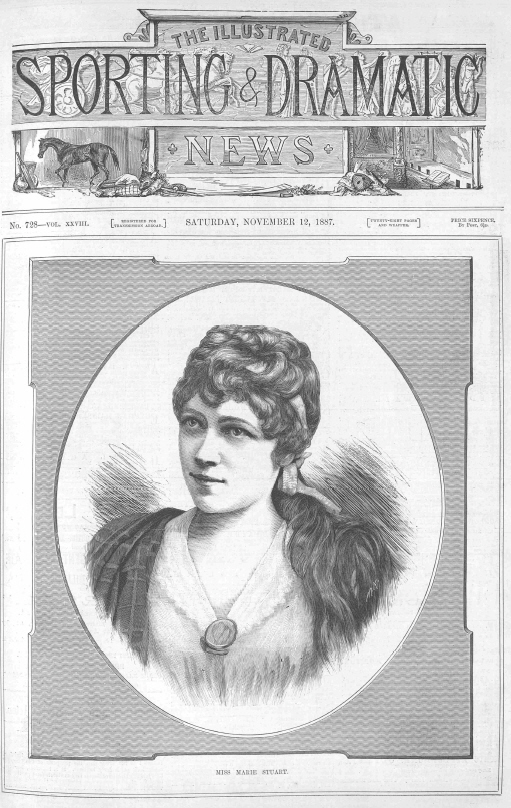|
Play List: 4. Corinne 7. The Mormons 9. Lucy Brandon 10. Storm-Beaten 11. Lady Clare 13. Bachelors 14. Constance 15. Lottie 16. Agnes 17. Alone in London 18. Sophia 19. Fascination 20. The Blue Bells of Scotland 21. Partners 24. Angelina! 25. The Old Home 26. A Man’s Shadow 27. Theodora 29. Clarissa 30. Miss Tomboy 32. Sweet Nancy 33. The English Rose 36. Marmion 37. The Gifted Lady 38. The Trumpet Call 39. Squire Kate 40. The White Rose 42. The Black Domino 44. The Charlatan 45. Dick Sheridan 47. Lady Gladys 48. The Strange Adventures of Miss Brown 49. The Romance of the Shopwalker 52. Two Little Maids from School ___ |
|
ROBERT WILLIAMS BUCHANAN (1841 - 1901) |
|
|
|
|
|
|
|
|
THEATRE REVIEWS 20. The Blue Bells of Scotland (1887) - continued
Aberdeen Evening Express (1 October, 1887 - p.2) THE NEW SCOTTISH DRAMA. The arrangements for the production of Mr Robert Buchanan’s new Scottish drama, “The Blue Bells of Scotland,” in the provinces, with genuine crofters in the eviction and other Highland scenes, are, I understand, nearly completed. The matter has been taken in hand by a syndicate of gentlemen well known in connection with the crofter movement, including two members of Parliament representing Scotch constituencies.—London Cor. ___
The Theatre (1 October, 1887) “THE BLUE BELLS OF SCOTLAND.” A new and original Comedy-Drama, in Five Acts, by ROBERT BUCHANAN. |
|
|
|
With fresh upholstery and regilding, the handsome foyer adorned by some good pictures, and a new act-drop by Mr. A. Calcott, Miss Harriett Jay, the manageress of the pretty little theatre in Great Queen Street, has many of the surroundings that should lead to success. But it is very questionable whether on such a small stage as she has at her command it was wise to produce such an elaborate play as the one under notice, and also whether it is fitted for a house which, from its size, appears to be the home for light comedietta and vaudeville. “The Blue Bells of Scotland” is a melodrama of the old pattern, containing incidents and situations which lend themselves to display on a large scale, and which do not bear cramping. Hence, in a great measure, it was not so acceptable as under other circumstances it might have been. Besides this, the wrongs of the crofters and their sufferings appear overdrawn—some of the dialogue is bombastic, and is evidently what was written by Mr. Buchanan when he was a young man. Much of the plot, the author owns, is taken from his prose romance, “A Child of Nature,” and follows the fortunes of Mina Macdonald, a lovely girl of good but decayed family, who lives with her foster-father, Koll Nicolson, in the Scottish Highlands. Her brother, Graham, is the next heir to the Arranmore estates, now held by an absentee landlord, who deputes his power to a griping factor, Peter Dalston. Lord Arranmore at length comes North for the shooting, sees Mina, who falls in love with him; but as she will not leave her home he carries her off by force to London. On the journey he goes through the ceremony of what he fancies is a mock marriage, and, under this idea, he tells her she is no wife when they have lived together some time, and, being ordered on foreign service, leaves her to the tender mercies of Dalston. To escape his odious proposals, for he is also madly in love with her, Mina rushes from the house, and is found straying, homeless, in Piccadilly at night by her brother, who is in search of her and her betrayer. In pursuit of the latter, Graham follows him to Burmah, having enlisted in his regiment. There, regardless of discipline, he forces his officer to fight with him, but as they are attacked by the enemy, he forgets his sister’s wrongs, and back to back they defend themselves from their assailants. Lord Arranmore dies of his wounds, but not before he has admitted that Mina is really his wife, and Graham Macdonald returns home with a V.C., and to find himself in possession of the Arranmore estates, at which he arrives in time to stay the evictions that are being ruthlessly enforced by Peter Dalston; and engaged to Lady Ethel Gordon, who, it being Leap Year, has proposed to him, fearing that as she has once refused him he will not renew his suit. CECIL HOWARD. ___
The New York Mirror (1 October, 1887 - p.10) London News and Gossip. LONDON, Sept. 15. . . . On Monday night Harriet Jay, author of several plays and novels and sister-in-law to Robert Buchanan, commenced her management of the Novelty Theatre in Lincoln’s Inn, by the production of a new comedy drama nailed up by the said Buchanan and entitled The Blue Bells of Scotland. This proved to be something of a play with a purpose, for it dealt largely with the Highland “Crofter” question, which some time ago agitated all and sundry. In the story of the Blue Bells, etc., we are shown a highly-strung, but hard up hero, who is the rightful heir to certain Scotch estates of enormous dimensions; a wrongful owner of the same, called Lord Arranmore, who, after being an absentee landlord for years and allowing all sorts of oppression and evictions to proceed in his name, suddenly appears upon the estates and at once abducts the rightful heir’s sister by bearing her aboard his lugger—here called his yacht. He inveigles the pure lassie into a mock marriage; then hands her over to his rascally steward, and then proceeds to Burmah to fight for his Queen. Out here, however, he comes face to face with the heroic Avenger, who has joined the ranks on purpose to hunt the seducer down. The men eventually, after a sharp battle with the local enemy, confront each other in the jungle, just as Terriss meets Cartwright in the new Adelphi success, The Bells of Haslemere; but just as he is about to stab him in combat and under the fifth rib, lo and behold you! the enemy is heard approaching again, and so the would-be Avenger hands the seducer back his sword and they face the foe together. Anon, the wicked lord repents and dies while homeward bound, and the long defrauded Avenger comes into his own again and marries a titled lady to whom the wicked lord was betrothed before he carried off the hero’s sister. * * * The Blue Bells, etc., had many good points, especially in its comic business and dialogue. Also it had more than one good situation. These, however, were spoilt by a superabundance of ultra-romantic dialogue—too much “Hieland” singing and dancing, a totally unnecessary street-snow scene, several absurd attempts at London realism, and, above all, by utterly bad acting by the heroine (Miss Fortescue, of Garmoyle fame) and by the villain (A. Elwood). Henry Neville and Miss Jay played well; so did the comic people; but their earnestness was all but wasted. ___
The Illustrated Sporting and Dramatic News (8 October, 1887 - p.19,22) OUR CAPTIOUS CRITIC. |
 |
 |
||||
 |
|||||
|
[Notice from The Times (8 October, 1887 - p.8).]
The Oban Times (8 October, 1887 - p.5) CROFTER WRONGS DRAMATISED. We learn that Mr Robert Buchanan has expressed an opinion that his play, “The Blue Bells of Scotland,” has been pooh-poohed by some of the critics owing to political bias. The Scotch supers in the earlier part of the play, it appears, will now be acted by real Scotch crofters whom Mr Buchanan has engaged. The play still attracts crowded and enthusiastic audiences. The great feature of “The Blue Bells” is the passage at arms between Peter Dalston, the factor, who prides himself on having trebled the rent roll, and Graham Macdonald, the friend of the people, who protests in word and deed against the work of hard-hearted factors and absentee rent lords. ___
The Daily News (10 October, 1887) From a remarkable official announcement it would appear that the destinies of the new play entitled “The Blue Bells of Scotland” are in the hands of a “syndicate formed by Highland gentlemen and members of Parliament,” and that in accordance with a wish expressed by these irresistible persons, “that popular drama” is temporarily withdrawn previous to its reproduction in a larger theatre. Withdrawals equally premature of dramas equally popular are not wholly unknown to the annals of the stage; but this is, if we mistake not, the first time that such reasons as these have been officially given. The immediate result has been the rather sudden closing of the Novelty Theatre. ___
The Globe (10 October, 1887 - p.1) PLAYS WITH A PURPOSE. Mr. Robert Buchanan’s drama, “The Blue Bells of Scotland,” was performed for the last time, as far as the Novelty Theatre is concerned, on Saturday evening. It has been taken up, it seems, by some enthusiastic politicians, who propose to send it round the country, with a view to arousing sympathy with the cause of the Scotch crofters. Those parts of the play which have reference to the Scotch land question are, we gather, to be elaborated, and Mr. Buchanan is to figure, apparently, as the author of a drama written for the advancement of a political purpose. He disclaimed any such purpose when the work was brought out at the Novelty; it will be interesting to note whether, in its avowedly political form, it will continue to be described on the bills as “by Robert Buchanan.” From the tactical point of view, the aforesaid enthusiasts are not to be blamed, for undoubtedly a drama with a political bias might conceivably be made to influence the less intelligent class of voter. “It’s Never too late to Mend” did a good deal to bring the maladministration of prisons into prominence; and possibly “Drink,” by the same author, was the means of bringing home to a certain number the frightful results of chronic drunkenness. But obviously the game is one in which the champions of both sides of a controversy might legitimately take part. Mrs. Craik once wrote a novel in support of marriage with a deceased wife’s sister: another author might have pictured quite as successfully the evils of such unions. And so with playwrights. If it is open to one of them to portray landlords as grasping and tenants as suffering, it is equally open to another to do exactly the reverse—with at least equal truth. ___
The Era (15 October, 1887) WITHIN a few hours after the falling of the curtain Miss Harriett Jay and Mr Buchanan received half a dozen distinct offers for the country rights of Fascination, and accepted the most favourable, that made by Messrs Miller and Elliston. Miss Jay will play in the comedy during its London run, and afterwards tour with it in the chief provincial towns, previous to which, however, she will appear at the Grand Theatre, Islington, with Mr Henry Neville, in The Blue Bells of Scotland. ___
The Entr’acte (22 October, 1887 - p.5) Mr. Robert Buchanan’s trifling, “Fascination,” is more likely to prosper at the Novelty than the “Blue Bells of Scotland,” a design which could not be comfortably accommodated on this stage. At Drury Lane, the “Blue Bells of Scotland” would have stood a better chance, for here it would have been pruned of those comedy excrescences which were not funny in themselves, and which seriously obstructed the action of the drama. I hope Miss Jay will succeed at the Novelty, for she is an amiable and clever lady, and, moreover, does her best to deserve success. Whoever brings triumph to the Novelty, however, will have to put his or her best foot forward. ___
The Referee (23 October, 1887 - p.3) On Tuesday next, take note, comes the matinée at the Opéra Comique for the benefit of the Balaclava hero-actor, W. H. Pennington, in whose special honour Miss Millward is to recite “The Charge of the Light Brigade.” Some had expected Pennington would recite this himself. he will, however, appear with Miss Wallis in “The Taming of the Shrew”; Henry Neville and Harriett Jay will do something from “The Blue Bells of Scotland”; and a number of other artists, more or less eminent, will add to a good programme. Miss Harriett Jay is tired of the Novelty, and intends to be done with it as soon as possible. “The Blue Bells of Scotland.” as you know, is to be worked in the provinces by “a syndicate of Highland noblemen and gentlemen,” and Harriett says that “Fascination” is eagerly wanted at another West-end theatre—some say the Vaudeville, but nothing is settled. ___
The Stage (28 October, 1887 - p.13) The company playing The Blue Bells of Scotland at the Grand this week are substantially the same as when the play was produced at the Novelty last month, with the exception that Miss Marie Stuart is now replaced in the part of Jessie Macfarlan by Miss Minnie Bell, who plays the sprightly Scotch lassie with brightness and animation. ___
The Era (29 October, 1887) MR. W. H. PENNINGTON’S MATINEE. It was quite in accordance with the eternal fitness of things that Mr Pennington, an able actor, and one of the surviving heroes of the famous Balaclava Charge, should have a complimentary benefit on Tuesday, the anniversary of the said charge; but it was quite out of accord with any fitness at all that the public announcement should have given two o’clock as the time of commencement, while the programmes put it at a quarter past that hour. Time nowadays is precious, and he who is led by misrepresentation into wasting fifteen minutes has some reason to grumble. The theatre had been kindly lent for the occasion by Mr J. F. Sheridan, and there was a fair attendance. After an overture by the orchestra, directed by Herr Meyer Lutz, there was presented the Burmah Act from Mr Robert Buchanan’s drama The Blue Bells of Scotland. Mr Henry Neville most distinguished himself as Graham Macdonald, the determined brother, who in the jungle gets the opportunity he has so longed for, and makes such poor use of it when he comes face to face with the man who has so cruelly wronged his sister. Mr Neville’s supporters were Mr Scott Buist as the Hon. Sam Gordon, Mr Eardley Turner as Sergeant Milligan, and Mr A. Elwood as Lord Arranmore. Mr James Fernandez subsequently gave his admirable and now familiar recital of “The Pride of Battery B,” and was followed by Miss Millward, who displayed unlooked-for power, and fairly electrified the house by a magnificent rendering of “The Charge of the Light Brigade.” We do only bare justice to the clever young actress when we say that we have never heard the Poet Laureate’s world- famous lines given more effectively. Mr Leo Stormont’s fine voice was heard to much advantage in Pinsuti’s song “Queen of the Earth.” “The Pennington March,” specially composed for the occasion by Mr H. Duggan, having been played, there was performed Shakespeare’s diverting comedy “TAMING OF THE SHREW.” . . . In the concluding part of the programme Mr Hayden Coffin sang “Queen of my Heart,” and was encored. Mr Charles Collette provoked laughter with some jaw-graphical patter; Miss Harriett Jay gave with much feeling, but hardly sufficient force, Mr Robert Buchanan’s touching poem called “Nell;” Miss Letty Lind won enthusiastic applause for her clever rendering of the well-known “polyglot Love” song and of “En Revenant de la Revue;” and Mr E. J. Lonnen obliged with his funny interpretation of Mr Robert Martin’s funny song from Miss Esmeralda, “Killaloe.” Miss Marion Hood, Mr J. L. Shine, and the Two Macs were announced, but did not appear. ___
The Sheffield Evening Telegraph (29 October, 1887 - p.2) AN awesome and mysterious change has come over the spirit of the Highlanders of Scotland. But a few years ago they were walking in virtue’s straitest path, and shunning the temptations of the world with an earnestness which men might mock, but could not deny. Then they looked upon the Southrons, and especially those hailing from cities, as children of darkness, to tread in whose footsteps was the surest road to destruction. Trained up in a narrow and gloomy school of thought, they regarded all that was light and fanciful as a device of the Evil One. Music in the kirk was an abhorrence to their souls, and the phillipics with which DEMOSTHENES denounced the Macedonian conqueror were mild compared with the torrents of wrathful eloquence which the orthodox Highlander poured upon that sinful thing, “the kist o’ whistles.” But even a church organ failed to stir the Gaelic wrath to its lowest deeps. That was only done by touching upon the subject of the stage. Then assuredly were the floodgates of ferocity opened, and then were the vials of unquenchable Highland horror and hatred discharged against the “godless and soul-destroying play-acting,” which the Gael has learnt from his minister to revile. That was the state of things in the past. What they are in the present may be gathered from the fact that the Glendale men of Skye have met and adopted a resolution thanking Mr. ROBERT BUCHANAN for his new play, in which a vivid dramatic representation is given of the wrongs of the Crofters. This decision betokens an absolute revolution in Highland customs and beliefs, and will be received with positive terror by the adherents of the “auld licht.” Which is right and which wrong is a matter of opinion, but as a phenomenon and a sign of how the wind is blowing in the Highlands the Glendale resolution is interesting. ___
St. James’s Gazette (29 October, 1887 - p.5) CORRESPONDENCE. POLITICS ON THE STAGE. To the EDITOR of the ST. JAMES’S GAZETTE. SIR,—On a certain Monday evening recently I assisted, with some other longsuffering members of that race of martyrs called dramatic critics, at a mournful function at the Novelty Theatre. The occasion was the production of a play entitled “The Blue Bells of Scotland.” Why the author of this “new and original comedy-drama” entitled it “The Blue Bells of Scotland” was one of the riddles set for the martyrs aforesaid and the public to solve. There was a general impression on the first night that the title was chosen because it sounded well; and that “The Palm-trees of Burma” or “The Daisies of Shaftesbury-avenue” would have suited the play as a title quite as well. But subsequent occurrences have shown how wrong this frivolous theory was. Mr. McPherson, the “Glendale Martyr,” moved the following resolution:—“That this meeting expresses its best thanks to Mr. Robert Buchanan for the effective manner in which he has dramatized the grievances of the Highland crofters, and the tyranny of Highland landlords and factors in ‘The Blue Bells of Scotland,’ now being performed at the Novelty Theatre, London.” The resolution was adopted, and cheers were given for Mr. Buchanan and “The Blue Bells of Scotland.” It only remains now for the Separatists to get a sensation cast for the play. The villains would be undoubtedly handed over to leading Unionists. The wicked lord might be played by Lord Randolph Churchill, and his “factor” by Mr. Chamberlain. The hero would naturally be Mr. Labouchere or Mr. Conybeare; while the part of the gentleman who does the prophet business would suit Sir William Harcourt admirably. The “Wandering Ballad-Singer” might suit the ex-Prime Minister himself; while the Corporal of Marines who, instead of putting down the crofters, sympathizes with and supports them, would be the very part for Sir George Trevelyan.—I am, Sir, your obedient servant, ___
The Illustrated Sporting and Dramatic News (5 November, 1887 - p.1,14) |
 |
|
OUR ILLUSTRATIONS. MISS HARRIETT JAY. MISS HARRIETT JAY, who was born in 1859, adopted the stage about the year 1880, when she joined a country company, an d played for some time under an assumed name. Her first appearance under her own name was at the Crystal Palace, where she appeared with Mr. Henry Neville and played the part of the Queen of Connaught, which was originally sustained by Miss Ada Cavendish. Her first appearance at a West-end theatre was as Lady Jane Grey, in The Nine Days Queen. After this she played for a season at the Olympic, and then accepted an engagement from Mr. George Rignold to star in the provinces as Lady Clancarty. Returning to London, Miss Jay created the part of the Hon. Cecil Brookfield in Lady Clare, a part she played during the run of that piece at the Globe. She then accepted an offer from Mr. Augustus Harris, and went for a season to Drury Lane. This was followed by a visit to America, where during her brief stay Miss Jay appeared as the Hon. Cecil Brookfield and Lady Clancarty. On her return to England she was seen at the Olympic in Alone in London, playing first the character of Tom Chickweed, a costermonger boy, and afterwards that of Nan. During the run of Alone in London she was engaged to appear at matinées at the Opera Comique in the character of Sappho. During a provincial tour of Alone in London Miss Jay played the part of Nan. Many years of hard work were beginning to tell upon her health, so on the termination of this tour she took a long rest. Her next appearance was at the Novelty Theatre, where she filled the parts of Lady Ethel Gordon in The Blue Bells of Scotland, and of Lady Madge Slashton in Fascination. It is said that this piece is to be reproduced, and that Miss Jay will resume her original character. She is understood to be studying Rosalind with a view to a revival of As You Like It, but no details as to this are at present forthcoming. Our picture is from a photograph by Messrs. Boning and Small. ___
The Illustrated Sporting and Dramatic News (12 November, 1887 - p.1,12) |
 |
|
MISS MARIE STUART. MISS MARIE STUART is a native of the Western Highlands, and the daughter of a master in the merchant service. At his death the subject of this sketch made her fist appearance upon the stage in the great spectacle of The Nations, one of the splendid pantomimes for which Glasgow has been long known creditably. Her manager, Mr. John Coleman, was so pleased with her earnestness and intelligence, that on returning to England he enrolled her as a member of his travelling company. For upwards of two years she studied the rudiments of her art under that gentleman, and it is to his tuition that she ascribes whatever proficiency she has acquired. It was during this period that Mr. Robert Buchanan and Miss Harriett Jay met Miss Marie Stuart, with the result that she was engaged for the part which she played at the Novelty in The Blue Bells of Scotland. She has since been engaged by Mr. Harris to appear at the Grand Theatre, Glasgow, in his new Scotch drama. Our portrait is from a photograph by Boning and Small, Baker-street. ___
[Note: _____
Next: Partners (1888) Back to the Bibliography or the Plays or Harriett Jay Theatre Reviews
|
|
|
|
|
|
|